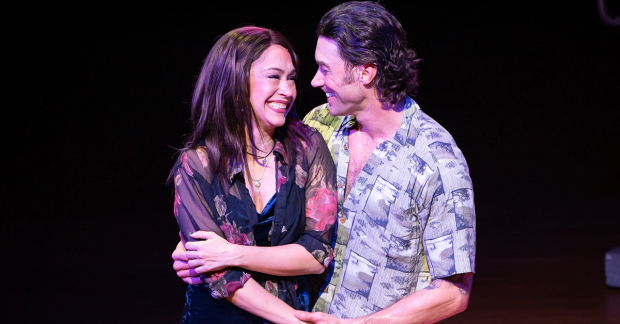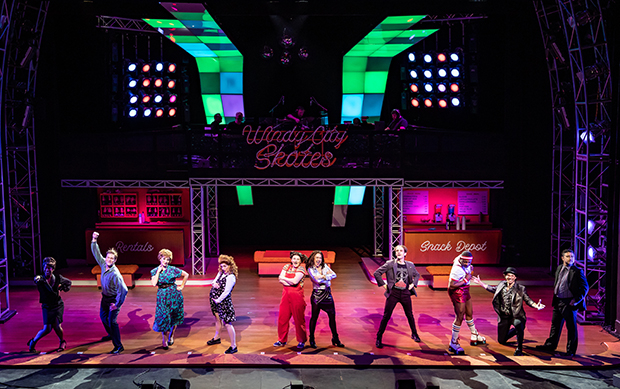Review: Diana DeGarmo and Ace Young in Roller Rink Coming-of-Age Story Skates
The new musical has its world premiere at the restored Studebaker Theater in Chicago.

(© Liz Lauren)
Wife-and-husband team Christine Rea (book and lyrics) and Rick Briskin (music and lyrics) have doubled as authors and lead producers for the world premiere musical Skates. If this was an Off-Loop show at a small non-profit venue, it would be doing just fine, but it's having a rough time in downtown Chicago as a commercial production at the historic 1,000-seat Studebaker Theater, running only through June 26 instead of the whole summer, as originally announced. The question is, do Rea and Briskin see a future for Skates, and do they have what it takes to shape it into a stronger show?
The vision for Skates is Rea's, with a storyline that reflects some of her experiences as a tween-ager in south suburban Chicago, where Saturday at the local roller rink was a big night away from the 'rents, and the rink welcomed a wide swath of adolescent society. Skates opens in 1994 with heroine Jacqueline Miller (Diana DeGarmo) as a rising rock singer-songwriter on a national tour. Within minutes, however, the show flashes back to 1977 Chicago where Jacqueline encounters her 12-year-old self, Jackie (Emma Lord). The flashback—which dominates most of the show—reveals that Jacqueline's strengths and insecurities were formed in large part by the teenage culture of the Windy City Skates roller rink. To bookend the 1994 storyline, Windy City Skates is about to re-open after being closed for some years, and rock star Jacqueline has agreed to appear.
The biggest strength of Skates is the pleasantly mainstream rock score, with nods to doo-wop, R&B, soul, and punk. Many songs work quite well—such as the love duet "I'm Crushin' on You" and Jacqueline's penultimate rocker "You Say You're Sorry"—but several songs should be cut, among them "The Ouija Song" in Act I. Oddly, one very good song is in the wrong place: "Someday," a late-1950s soft rocker sung to troubled Jackie by her mom and dad (Cory Goodrich and Jason Richards). Placed late in Act II, it slows the action just when it needs to accelerate, and it needs to come earlier in the show. Skillful orchestrations for two keyboards, bass, drums, and guitar are by Briskin and Daniel A. Weiss, who also is musical director.

(© Liz Lauren)
There are book-related problems as well, such as a completely unnecessary intermission. Act II begins precisely at the moment Act I ends, so why bother? Cut the intermission and two or three songs and "Skates" could be a tight 100 minutes. Also, there is a roller rink character, Jack (an energetic Kelvin Roston Jr.), who has a lot of stage time and a couple of songs, but has no role in the story. Why is he there? Make him count or cut him. Then, the show's major physical action is a subplot in which Jackie's older brother (Zach Sorrow) takes on the local teen bully and, unnecessarily, drug dealer (Ace Young). This makes both Jackie and Jacqueline passive observers, which isn't a good position for the show's heroes. Finally, the happy ending feels tacked-on and unearned—Jacqueline's true love in 1994 turns out to be a boy she hasn't seen since she was 12 in 1977—which only underscores the missing character development.
"Skates" boasts a hardworking cast with great voices. Star billing goes to real-life couple, DeGarmo and Young, both well-known from American Idol and various theater credits. Good as they are, the standout is Lord as young Jackie. Except for these out-of-towners, the 10-person cast and most of the production team are talented Chicago theater veterans, among them director Brenda Didier and choreographer Christopher Chase Carter, whose pseudo-skating work is impressive. Elizabeth Flauto is credited with "custom craft work on Skate Boots," which look like skates but aren't, yet allow dancers to slide and glide (with more control than they would have on real skates).
Skates has had difficult gestation. It was slammed by the Pandemic just as it prepped to open two years ago at the smaller Royal George Theatre, which then folded its tents. The scenery, already constructed, had to be adapted (by Chris Merriman) for the Studebaker (the program does not otherwise credit a scenic designer). In addition to star salaries, the larger Loop venue meant a considerably higher weekly nut, which the show has not been generating.
Of course, Rea and Briskin still have the vehicle itself with its strong score, and it could have future life if they are willing to make the changes necessary to keep Skates rolling.








